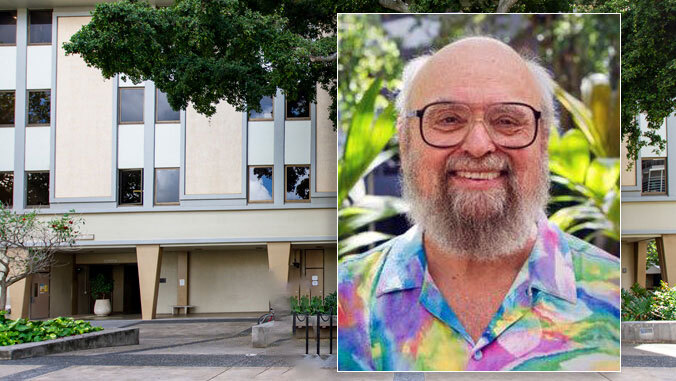
An international honor presented biannually to a scientist whose research career has had a major impact on the understanding of cosmic rays is being awarded to a University of Hawaiʻi at Mānoa Department of Physics and Astronomy faculty member. Professor John G. Learned is the recipient of the 2023 Yodh Prize and a $2,000 award for his “groundbreaking ideas and profound influence on the early development of neutrino astronomy,” according to the prize’s inscription.
The prize was announced in July 2023 at the International Cosmic Ray Conference, held this year in Nagoya, Japan.
“It is a grand time seeing that my 50 year long goal of helping initiate cosmic neutrino astronomy has now led to fruition with the IceCube experiment,” Learned said. “There is great satisfaction in being recognized by one’s peers for having a long and successful career in investigating the mysteries of physics.”
Learned has authored more than 300 publications, mostly relating to the study of elementary particle physics and astrophysics, and has more than 47,000 citations. He has been a pioneer in launching a new field of particle astrophysics, viewing the universe through what may be the dominant form of matter, neutrinos (subatomic particles with no electrical charge).
He is a world authority in particle astrophysics, and travels widely to give invited lectures at international meetings. Learned’s group is heavily involved in several underground experiments in Kamioka, Japan. The Super-Kamiokande experiment is observing neutrinos from the Sun, studying neutrinos produced by cosmic rays hitting the Earth’s atmosphere, looking for the decay of protons (a particle in the nucleus of every atom) and keeping watch for supernovae (star explosions) in our galaxy. This experiment produced evidence for neutrino oscillations (changing variety) and mass, with much acclaim in 1998 leading to researchers connected to UH winning a Nobel Prize in 2015.
Learned has been on the faculty at UH Mānoa since 1980. His research has brought several millions of dollars to the state. Learned received the Rossi Prize in 1989, the Asahi Prize in 1998 and the UH Regents Medal for Excellence in Research in 1999. He was awarded the ARCS Scientist of the Year prize in 2007 and the Breakthrough Prize in Fundamental Physics three times in 2015.
Learned earned a PhD in physics from the University of Washington, an MS from the University of Pennsylvania and a BS from Columbia College.
High praise from former student, colleagues
UH Mānoa Department of Physics and Astronomy Professor Jelena Maricic said that Learned was her PhD advisor and therefore one of the persons most responsible for her own career, calling him, “one the greatest visionaries of neutrino physics and the father of neutrino astronomy.”
Professor Henry Sobel from the University of California, Irvine, added, “The field of neutrino astronomy is growing rapidly. The field is transitioning from the initial discovery era to increasingly precise measurements that bring new scientific opportunities. These discoveries are the culmination of a many decades-long process of instrumental and scientific development. John Learned was the world leader in the initial founding of the field and for the development of many of the experimental techniques.”
Professor Christopher Wiebusch of RWTH Aachen University, said, “John Learned has added countless ideas, theoretical and experimental work, to the field of neutrino physics and astrophysics. He is a brilliant scientist that has contributed to seminal discoveries with underground detectors. He is one of the very founding fathers of the field of high-energy neutrino astronomy with underwater and under-ice neutrino telescopes that have recently opened a new astronomical window to the Universe.”

